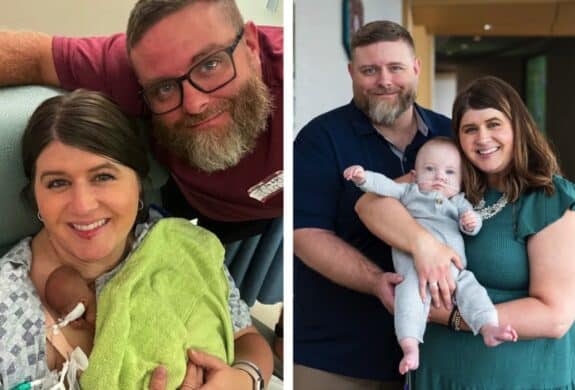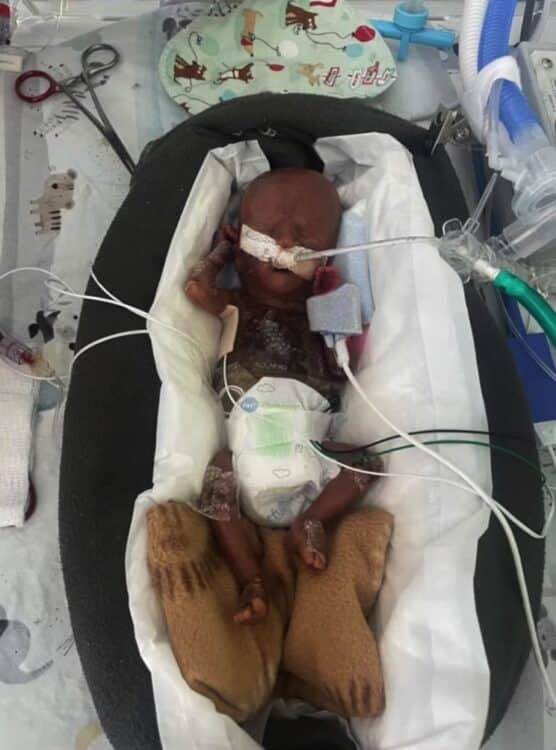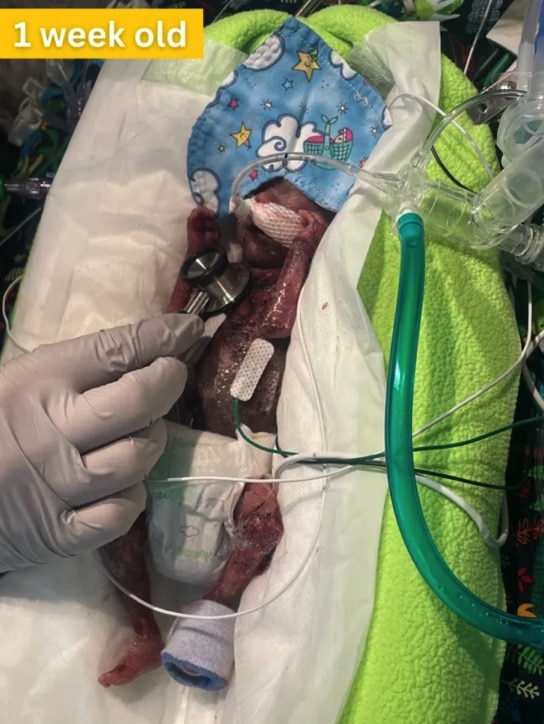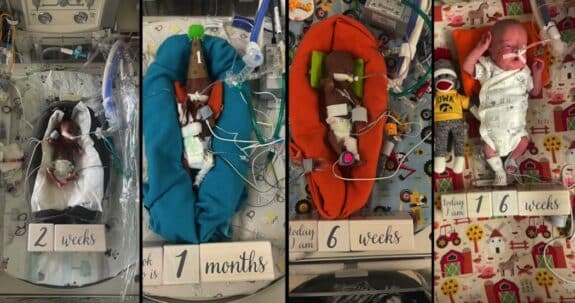In the days after giving birth, most new parents are adjusting to sleepless nights and feeding schedules. But when you deliver at just over 21 weeks, those early days look nothing like the typical newborn experience. For Mollie and Randall Keen, it meant waiting in a hospital room in Iowa City, praying their son Nash would stay put just a little longer, because time, in this case, meant survival.
At 21 weeks and 0 days, Nash Keen arrived into the world weighing just 10 ounces, smaller than a soda can, and became the most premature baby ever to survive. Now, as he celebrates his first birthday, his infectious giggle masks the fierce resilience it took to get here.
Nash’s story begins with heartbreak. Less than a year before his birth, Mollie and Randall lost their daughter McKinley at just 18 weeks. The loss led to a diagnosis of an incompetent cervix and confirmed what Mollie already knew from her PCOS diagnosis: pregnancy wouldn’t be easy.
When Mollie found out she was pregnant again, joy was quickly replaced by anxiety. At her 20-week scan, a gut feeling prompted her to ask for a closer look, and doctors discovered she was already two centimeters dilated. Bed rest followed. So did fear.
“I thought we were going through the same thing again,” Mollie said. “We really didn’t know how to stop it.”
But a late-night post in a support group changed everything. A mom told Mollie about Stead Family Children’s Hospital at the University of Iowa, one of the few in the world willing to intervene as early as 21 weeks.
It was 2 a.m. on a Tuesday when contractions started. Mollie and Randall raced from Ankeny to Iowa City, hoping Nash would stay put just a little longer. At the hospital, her water broke. The team moved fast to delay delivery; every hour mattered.
On July 5, just past midnight, Nash officially reached the 21-week mark. Hours later, Mollie had that same “off” feeling she couldn’t ignore. When doctors checked, they realized it was time.
Delivered by high-risk OB Dr. Malinda Schaefer, Nash was born head-down and quickly whisked to the NICU. The team didn’t know if they could intubate him, many babies born this early are simply too small. But Nash was just big enough.
His heart rate stabilized. His oxygen levels held. And for the first time, hope felt possible.
At most hospitals, a baby born at 21 weeks wouldn’t even be offered intensive care. But Iowa is different.
“We have begun to treat some 21-week babies if their parents wish us to,” said longtime neonatologist Dr. Edward Bell. “Our NICU results for 22-week babies are among the best in the world.”
A key part of that success is hemodynamic monitoring, a specialized ultrasound technique used to precisely monitor blood flow and heart function in real time. Nash was one of the first patients to benefit from it so early on.
When his blood pressure dropped after birth, doctors could see his heart was functioning well. Instead of guessing, they adjusted his treatment with pinpoint accuracy. That likely helped prevent complications like brain bleeds, a major risk for micro-preemies.
“Nash was incredibly resilient,” said Dr. Amy Stanford, the neonatologist who placed his breathing tube. “He let us do what we needed to do to help him.”
The days that followed were intense. Nash was, at one point, the sickest stable baby in the NICU. He endured surgery for a perforated bowel, monitored heart conditions, and received countless medications, all while surrounded by machines, tubes, and the love of his family.
Mollie and Randall didn’t get to hold him until he was 26 days old.
“There are highs and lows, and just when you feel like things are stable, something shifts,” Mollie shared online during Nash’s stay. “But I’m learning this roller coaster is part of the NICU journey.”
By the one-month mark, doctors began to believe Nash had a real chance of going home.
After 189 days in the hospital, Nash was discharged in January 2025. He still has follow-ups for chronic lung issues and a minor heart defect, but the care team is optimistic. They’re already weaning him off oxygen, and his development, while delayed, is moving in the right direction.
“My ultimate goal is that by the time he’s in kindergarten, no one will know he was born so early,” said Dr. Stanford.
He’s not crawling yet, but crucially, he hasn’t shown signs of cognitive impairment, a rare blessing for babies born this early.
For the Keen family, Nash’s survival is the product of top-tier care, persistent hope, and the lessons learned from every baby who came before him, including McKinley.
“Every patient teaches us something,” said Dr. Stanford. “Nash’s outcome reflects the progress we’ve made.”
As Nash turns one, surrounded by balloons and loved ones, his parents are filled with gratitude—and awe.
“I just hope Nash grows up knowing how deeply he’s loved,” Mollie said. “His story is one of strength. I want him to always carry that with him.”
More Amazing Babies:
- Held in Surgeons’ Hands Before Birth: The Baby Who Was Born Twice
- Baby Born at 24 Weeks After Georgia Mother Kept on Life Support
- Flint Police Officers Save Premature Baby with Life-Saving CPR After Backseat Birth
Best Baby Carriers
Table could not be displayed.This post includes affiliate links where we will receive a small percentage if you purchase through the link.











